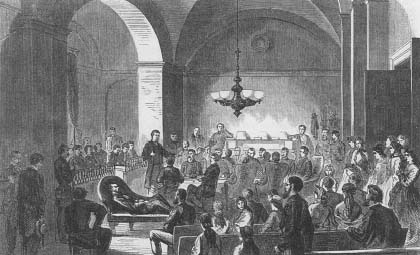Henry Wirz Trial: 1865
Wirz Tried For War Crimes, Union Prisoners' Testimony Destroys Wirz, Suggestions For Further Reading
Defendant: Captain Henry Wirz
Crimes Charged: 13 counts of murder, assault, battery, torture and other offenses against Union prisoners
Chief Defense Lawyer: Louis Schade
Chief Prosecutor: Judge Advocate Colonel N. P. Chipman
Judges: Military Commission officers Brevet Colonel T. Allcock, Brevet Brigadier General John F. Ballior, Brigadier General A. S. Bragg, Brigadier General Francis Fessenden, Brevet Major General G. Mott, Lieutenant Colonel J. H. Stibbs, Brevet Major General L. Thomas, and Major General Lew Wallace
Place: Washington, D.C.
Dates of Trial: August 23-October 18, 1865
Verdict: Guilty
Sentence: Death by hanging
SIGNIFICANCE: After the Civil War, the Union tried Confederate Captain Henry Wirz for war crimes resulting from his command of a prison camp for Union captives at Andersonville, Georgia. Henry Wirz's trial was the first war-crimes trial in U.S. history and the only trial for war crimes of a Confederate after the Civil War.
Toward the end of the Civil War, General William T. Sherman launched his famous March to the Sea through Georgia. Sherman's troops stripped the land of food and destroyed every plantation, railroad track, and other things of military importance in their path. As they cut a swath 60 miles wide through the heart of the crumbling Confederacy, Sherman's troops encountered some men, nearly starved to death and in tattered clothing, who claimed that they had escaped from a Confederate prison camp at Andersonville, Georgia, where thousands more like them were still captive. When Union troops took Andersonville, they found these reports were true.
Like the Allied troops in 1945 advancing deep into the Nazi heartland and coming upon Auschwitz or Treblinka decades later, Union soldiers saw how in modern warfare a civilized country could treat its enemies with barbarism. In the middle of some of the South's richest farm land, Union prisoners starved to death. Captain Henry Wirz kept them under heavy guard on a small patch of land, through which a little creek flowed and provided the only source of drinking water and sanitation. The creek was soon fouled with excrement, causing disease to spread like wildfire among the prisoners penned up in Andersonville. Wirz did nothing to ensure that adequate food, clothing, or medical care reached the men under his care.
In his Andersonville diary, John Ransom wrote that in particularly bad months, one-third to one-half of the prisoners in Andersonville died from the terrible conditions there. Although these tragedies were taking place every month, Andersonville's population continued to swell due to fresh battles and Confederate captures of Union troops. For example, in August 1864, there were nearly 40,000 men in Andersonville, which was designed to hold only 10,000.
 Captain Wirz, reclining, the only person tried by the Union for war crimes following the Civil War.
Captain Wirz, reclining, the only person tried by the Union for war crimes following the Civil War.
After Union troops arrived, the liberated prisoners spoke of atrocities Wirz personally committed. According to the prisoners, Wirz had on several occasions shot, tortured, and otherwise mistreated Union prisoners for no reason.
Additional topics
- Hester Vaughan Trial: 1868 - Sentenced To Die
- Henry Flipper Court-Martial: 1881 - A Different Kind Of Trial, The Court-martial, Flipper's Later Fate, Suggestions For Further Reading
- Henry Wirz Trial: 1865 - Wirz Tried For War Crimes
- Henry Wirz Trial: 1865 - Union Prisoners' Testimony Destroys Wirz
- Henry Wirz Trial: 1865 - Suggestions For Further Reading
- Other Free Encyclopedias
Law Library - American Law and Legal InformationNotable Trials and Court Cases - 1833 to 1882